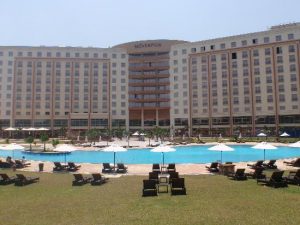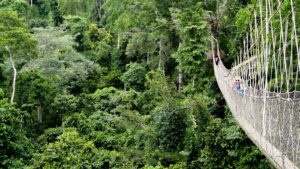
Accra, Ghana, July 14, 2020//-Sitting under a mango tree at Bubuashie, is Ms Belinda (real name withheld) who has just lost her job at one of the plush hotels in the capital city of Accra due to the devastating coronavirus disease 2019 (COVID-19).
She and her colleague workers numbering over 200 were asked to go home as the facility was shut down in March in response to the COVID-19 containment measures instituted by the Ghanaian government.
Challenging times for workers
Since then the 22-year-old lady is going through a lot to eke out a living. “Sometimes I eat once in a day”, Ms Belinda told African Eye Report in an interview.
“Previously, I used to contribute financially towards the upkeep of my siblings but because of the current situation, I’m not able to do so”.
She continued: “My plans of advancing my education to the university have put on hold now this is because my little savings have been depleted. I will only renew my dream of becoming a graduate when things normalize”.
Also sharing his traumatic experience, Sam Kojo , a father of five children who lost his job in the industry as a result of the COVID-19 crisis, said sometimes he wants to commit suicide because of the precarious situation he finds himself in with these young kids.
“It is unfortunate that I can no longer provide almost all their needs. I could not save enough money because of some projects that I was investing in”, he said.
It is only Ms Belinda and Mr Kojo who are going through the harrowing experience; there are several of their colleagues who lost their jobs in the tourism industry due to the pandemic.

A recent visit to some tourist facilities in Accra and other parts of Ghana revealed the sadness of the players in the country’s tourism industry as well as tourist facilities.
Difficulty in feeding animals in gardens
Authorities at the Kumasi Zoological Gardens said they were finding it difficult to get fresh meat and foodstuffs to feed hungry animals at the zoo.
The coronavirus pandemic in neighbouring countries particularly Burkina Faso has affected the importation of cattle by the Kumasi Abattoir, which is the main source of meat supply to the Kumasi Zoological Gardens.
“Kumasi Zoo was just picking up. The first quarter of the year saw a lot of visitors coming and that was very promising. We were projecting that we may get about 90,000 to 100,000 visitors in 2020. With the shutdown visitors are not coming”, the Manager of the facility, Dr. Paul Ziekah, told Joy FM, an Accra-based radio station.
Feeding over 100 animal species, including lions, has suddenly become a challenge. “For now we are having some challenges with getting enough meat for our carnivorous animals like the lions and the other wild cats that we have,” he said.
The Kumasi Zoo which sits on a 1.5 kilometre square land offers recreation and relaxation for visitors was set up to conserve nature and display indigenous wild animals in Ghana.

Besides, it also generates revenue for its internal operations and some for the state. According to the officials, the facility received about 100,000 visits since the beginning of this year which translated into GH¢250, 000.
But the outbreak of the pandemic since March 2020 has compelled the authorities to close the facility to visitors.
Suspension of eco-tourism centres’ operations
Deputy Chief Executive of the Forestry Commission, John Allotey, disclosed that the commission had suspended operations of the eco-tourism centres across the country in order to protect animals and patrons from COVID-19.
“We don’t also want to put people who come to our eco-tourism areas in harm’s way so what we have done is that Mole National Park has closed down; Kakum National Park has closed down and then the Kumasi Zoo and other places where we think we would have the numbers that are likely to adversely impact on the people so far as COVID-19 is concerned,” he told the radio station.
Hoteliers also affected badly
As stated earlier, some hotel managers have laid off workers including casual workers due to low patronage. These job cuts, according to the President of the Ghana Hotels Association, Dr. Edward Ackah Nyameke, are not deliberate.
He explained: “Hotels will not be able to pay them because clients are cancelling bookings and it is these same monies that workers are paid with. Hotels are forced to lay off workers because they are unable to pay staff amidst the pandemic”.
Tourism industry severely hit by the pandemic
Presenting a statement to Parliament on economic impact of the COVID-19 on the Ghanaian economy, Minister of Finance, Ken Ofori-Atta, said the tourism industry was severely hit by the pandemic.
He noted that the global trend in the cancellation of flights, closure of borders (land, sea and air), and the need to maintain social distancing, including the ban on public gatherings, are having huge negative impacts on economic activities in the hospitality industry as well as tourism industry.
“Among the worst hit are hotels, airline business, tourist sites and attractions, and car rental services. Hotel occupancy rates are down from 70% to fewer than 30% and staff are being sent home.
Even before the impact of the current lockdown, restaurants were already experiencing an average drop in patronage of 60%”, he told the legislators.
Scheduled international conferences in Ghana cancelled, include the 4th African Union 9 Specialized Technical Committee (STC) on Finance, Monetary Affairs, Economic Planning and Integration meeting and the G24 Technical meetings, which were programmed in early March 2020, resulted in a loss of 1000 combined participants and therefore a loss in 1000 hotel beds!.
Transportation services have been among the worst hit due to social distancing, closure of schools, and ban on public gatherings, according to him.
The coronavirus pandemic has led to massive losses in the world’s tourism sector, which has been placed at a standstill for nearly four months, according to the latest UNCTAD’s report, COVID-19 and tourism: Assessing the economic consequences, released in July 2020.
The losses will rise significantly, dealing a huge blow to the global economy, if the break in international tourism lasts for a longer period.
This could have a significant impact on employment and wages, particularly in economies heavily dependent on tourism, it added.
Tourism is a backbone of many countries’ economies and a lifeline for millions of people around the world, having more than tripled in value from $490 billion to $1.6 trillion in the last 20 years, according to UNWTO. But COVID-19 has brought it to a halt, causing severe economic consequences globally.
Prevailing lockdown measures in some countries, travel restrictions, reductions in consumers’ disposable income and low confidence levels could significantly slow down the sector’s recovery. Even as tourism slowly restarts in an increasing number of countries, it remains at a standstill in many nations including Ghana.
Call for stimulus package
To this end, the Chamber for Tourism Industry Ghana has called on the government as a matter urgency to announce a stimulus package for the country’s dying tourism sector which is the hardest hit by the COVID-19 pandemic.
The Chief Executive Officer of the Chamber, Mrs Odelia Ntiamoah who made the call, said it was important for the government to support the players in the industry to stand on their feet after the COVID-19 crisis.
To avoid a total wreckage of the sector, she called for a consultative meeting between all interested parties including the Ministry of Finance, on what should be done in the short, medium and long term.
This Mrs Ntiamoah said would include to tax cuts or tax delays; a proper research done on job losses and a possible government programme that will support them in the interim.
She also added that dialogue on using some hotels as centers at a subsidized fee to keep them running.
“Tourism employs between one in 10 to one in 14 people with majority being women. Government through the Exim bank should set some supporting fund aside, with a less than three percent interest to support the sector revive once more”.
Based on the above we propose that a special concession be made for women in the sector so that they are not disadvantaged”, she stated.
Response
Recently, Ghana’s President Nana Addo Dankwa Akufo-Addo assured that besides the GH¢600 million stimulus package earmarked for small and medium enterprises (SMEs) in the country, the government was working to secure bigger funds to support other industries including tourism in the face of the pandemic.
He said aside from GH¢3 billion from the commercial banks and the recovery funds secured from the International Monetary Fund (IMF), the government was also negotiating with the World Bank for funds, while at the same time planning to pump larger sums into the economy to support and empower the production sectors.
President Akufo-Addo gave the assurance when he met players in the tourism industry in the country to discuss the impact of the pandemic on their industry and how to get out of the crisis.
The groups included the Ghana Tourism Federation, the Tour Operators Union of Ghana, the Ghana Hotels Association, and the Car Rentals Association of Ghana, that welcomed famous rental services like FT Wedding Cars, the Chefs Association of Ghana and the Tour Guides Association of Ghana.
Key achievements before the pandemic
The huge success of the 2019 Year of Return had put Ghanaian tourism on the global map in a very positive manner and visitors left for their countries with a very good memory of Ghana.
In 2018, the tourism industry maintained its position as the 4th highest foreign exchange earner for the country after Cocoa, Gold and Oil & Gas, according to the Ministry of Tourism, Arts and Culture’s Programme Based Budget Estimates for 2019.
International arrivals is estimated to increase by 5% from 980,141 persons in 2017 to 1,029,148.05 in 2018 while corresponding receipts is estimated to increase by 5.1 % from $1,854.8 Million in 2017 to $1,947.5 Million in 2018 and contributing 4.9% to GDP.
In terms of employment there was an increase in total number of jobs (direct & indirect jobs) created by the tourism sector from 550,000 in 2017 to 602,425 in 2018. Out of which direct jobs provided by the tourism sector rose from 135,000 in 2017 to 158,231 in 2018.
Bottom line
While the players in the tourism industry wait for the coronavirus curve to flatten and decline they, eventually need to look at how to improve the digital environment in the sector. A proper road map for pushing domestic tourism in the interim will help the recovery process of the country’s tourism industry.
By Masahudu Ankiilu Kunateh, African Eye Report


